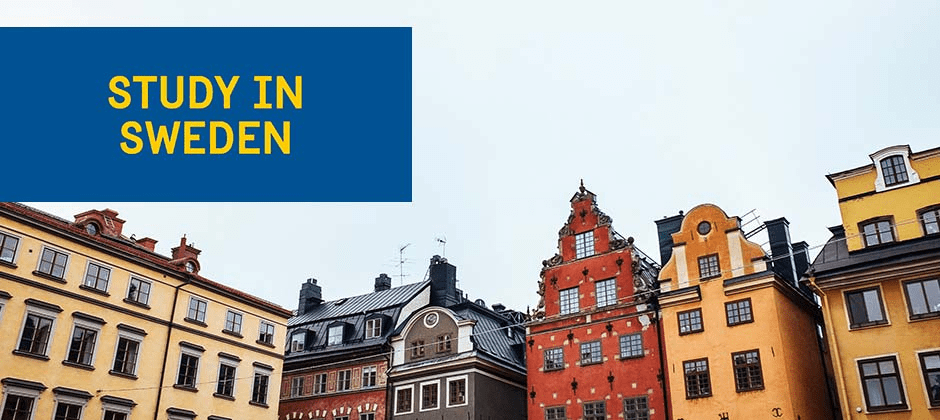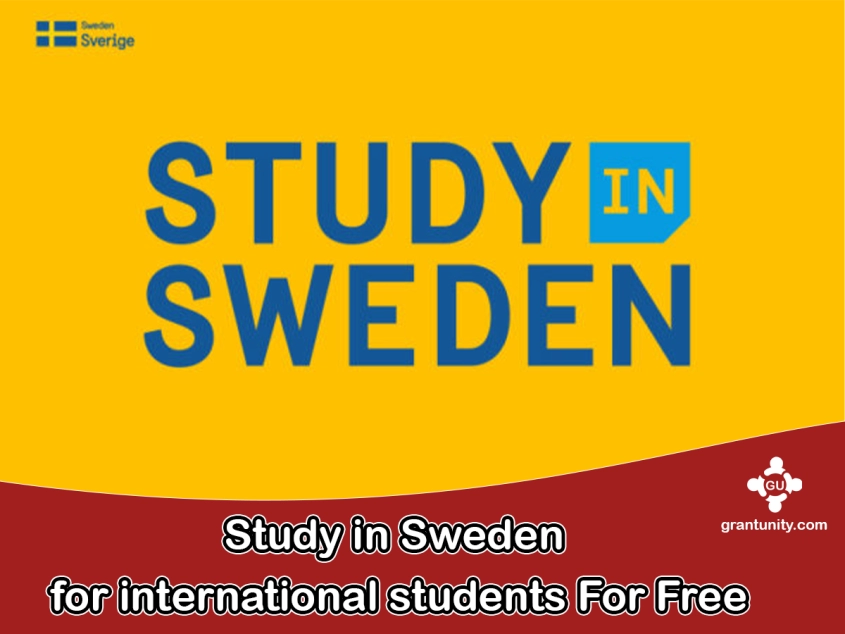Study in Sweden for international students For Free 2024-2025
Estimated reading time: 13 minutes
The top tier of prestigious universities in Europe cannot compare to the universities in Sweden. According to QS Universities, eight of Sweden’s universities are among the best. Additionally, each of them is among the top 350 universities. Higher education in Sweden is a good reflection of the fact that science and technology are the driving forces behind the nation’s economy. International students flock to student hubs like Stockholm, Lund, Gothenburg, Uppsala, and Umea, where both domestic and international students make up significant portions of the population.
English Taught Programs in Sweden:
Although English is Sweden’s most widely spoken language, Swedish and Finnish are also widely used. In fact, the universities in Sweden offer about 900 English-taught programs to foreign students. There are no communication barriers for international students coming to Sweden because everyone can understand and speak English.
Student Life in Sweden
Depending on the city you are in, Swedish student life varies. Every university has student clubs, which serve as the center of attention for the events. They plan various events for the students, whether it’s theatre or sports. Students looking for vibrant nightlife will find plenty of opportunities in large cities like Stockholm and Gothenburg. Swedish university students are very active, and both on campus and in the outdoors, sports are very popular in this country.

Study in Sweden: Overview
Sweden is regarded as one of the most advanced nations in the world and is often referred to as “a land of innovations.” The nation is renowned for offering innovative, high-quality education.
Sweden’s universities have a distinctive, student-centered educational system. The programs are designed to encourage student independent and group study.
Studying in Sweden helps students develop the true spirit of innovation and teamwork, two highly valued skills in the job market, and thus prepares them for a successful future.
Sweden As A Study Destination: Highlights
Here is an overview of Sweden as a study destination for students who are interested in pursuing higher education there:
| Language of Instruction | English, Swedish |
| Average Cost of Study | SEK 80,000/year |
| Average Cost of Living | SEK 700 – 1,200/ month |
| Sources of Funding | Scholarships, Aids, and part-time jobs |
| Exams Required | IELTS, TOEFL, PTE, GRE, GMAT, TISUS, etc. |
| Intakes | 2 times a year – Spring and Autumn intakes |
| Type of Visa | Type C, Type D |
| Top Courses | Engineering and Technology, Business and Management, Fine Arts, Physical and Life Sciences, etc. |
| Types of Degrees | Undergraduate Degree, Graduate Degree, Doctorate Degree |
| Best Student Cities | Stockholm, Lund, Gothenburg, Umea, Uppsala, Linkoping, Gavle etc. |
Why Study in Sweden?
Apart from its beautiful landscapes, liberal government, and high standard of living, Sweden is distinguished by its exceptional international student education system. Here are some of the main benefits of studying in Sweden:
- Sweden has a number of highly regarded universities that offer the highest caliber education. Instead of just traditional classroom instruction, the emphasis is on personalized learning, group work, innovation, and application.
- The main benefit of studying in Sweden is its interesting, enjoyable, and exciting student life. International students can experience an entirely new culture while living in excellent conditions.
- Swedish is the official language of Sweden, but many Swedes are also proficient in English. Sweden actually has some of the best English speakers in the world. Indian students can, therefore, more easily pursue their education in Sweden because there is no language barrier.
- One of the best benefits of studying in Sweden is the ease with which students can visit many other European nations. Sweden has excellent connections to other European nations.
- Leading international companies to have their headquarters in Sweden. This indicates that studying in Sweden will be very advantageous for international students in terms of job opportunities.
Education System-Study in Sweden
The preschool, or förskola, is where the Swedish educational system starts, followed by primary schooling and the Gymnasium, or high school. In Sweden, there are primarily 3 types of degrees available for higher education after completing upper secondary education, or what you might call the high school:
- Bachelor’s Degree: Full-time undergraduate degree which has a duration of 3 years.
- Master’s Degree: A postgraduate degree that spans over 2 years.
- Doctorate Degree: A doctorate degree takes a total of 2-5 years to complete.
International students can choose from a wide range of courses offered by the highly regarded Swedish educational system. Below is a detailed overview of the various higher education institutions in Sweden:
| Type of Institution | Key Points |
| University | Provide professional degrees and applied fine and performing arts qualifications. |
| University College | Offer professional, applied, fine & performing arts degrees, Master’s, and Ph.D. degrees. |
Credit System in Sweden
The ECTS Credit system is used in all Swedish universities. The final result is computed using all the credits a student accrues throughout the course.
- The Bologna System, which standardized European credentials, has been adopted in Sweden. ECTS credits are equivalent to the national system of credits (HP or “högskolepoäng”).
- 40 hours of full-time study per week equates to 1.5 college credits (HP). A student is required to enroll in 30 credits of coursework over each semester, which lasts 20 weeks. ECTS and Swedish credits are interchangeable.
- The seven-grade scale (A-F, Fx), the three-grade scale (VG, G, U), and the pass/fail system (G/U) are the three most popular grading schemes in Sweden. For grade comparison with other European universities, grades from all systems can be converted to ECTS.

Popular Universities in Sweden
Many prestigious universities in Sweden are accessible to international students who want to further their education and advance their careers. Check out a few of Sweden’s best universities:
| University | QS World Ranking 2024 | Average Tuition Fees / Year |
| Lund University | 87 | 100,000 – 420,000 SEK |
| KTH – Royal Institute of Technology | 89 | 366,000 SEK |
| Chalmers University of Technology | 121 | 140,000 SEK |
| Uppsala University | 124 | 90,000 – 135,000 SEK |
| Stockholm University | 148 | 90,000 – 140,000 SEK |
| University of Gothenburg | 180 | 104,542 – 281,392 SEK |
| Linkoping University | 329 | 80,000 – 136,000 SEK |
| Umea University | 365 | 93,000 – 364,500 SEK |
Top Courses Top Courses in Sweden
Swedish people are excellent in politics and the environment, have excellent infrastructure, and are technologically advanced. As a result, Sweden’s top courses focus on the abovementioned areas. The following list includes the top Sweden courses for visitors:
- Engineering & Technology
- Computer Science
- Humanities
- Environmental Studies
- Cultural Studies
- Law
- Architecture
- Mathematics
The most popular courses chosen by students in Sweden are:
| Program | Duration | Average Tuition Fees/ Year |
| BSc Information & Communication Technology | 3 years | SEK 119,186 |
| MSc Economics | 2 years | SEK 168,000 |
| BSc Mathematics | 3 years | SEK 135,000 |
| MSc Computer Science | 2 years | SEK 310,000 |
| MSc Data Science | 2 years | SEK 270,000 |
| MBA | 2 years | SEK 208,611 |
| LLM | 1 year | SEK 110,000 |
Admission Process in Sweden
The application process for Swedish universities is fairly straightforward and can be completed online. The following is a step-by-step process for international students to study in Sweden:
- Find a university and a program that best suits your interests.
- Check all the entry requirements and eligibility criteria for the universities you have shortlisted. Keep all of your documents close by as well.
- Head on over to University Admissions – Sweden’s central application portal. You have to complete your admission in Sweden via this site.
- Fill out the necessary forms, correctly upload all of the required documents, check the deadlines, and begin the process early.
- Pay the application fee of SEK 900.
- Wait for the universities to revert. You can check the status of your application at University Admissions.
- You can apply for a Swedish Student Visa once the university approves.
Sweden University Requirements: International Students
Meeting the eligibility and entry requirements is a crucial step in the application process. You can look up the requirements on the website of the university you want to attend. The following are a few of the most typical prerequisites for foreign students looking to study in Sweden:
| Degree | Requirements |
| Bachelor’s Degree | 12th standard certificate English language proficiency (IELTS – 6.5, TOEFL – 100) SOP |
| Master’s Degree | Bachelor’s degree recognized in Sweden. English language proficiency (IELTS – 6.5, TOEFL – 100) GRE/ GMAT SOP LOR & CV |
| Doctorate Degree | Bachelor’s degree Master’s degree in the subject intended for PhD degree English language proficiency (IELTS – 6.5, TOEFL – 100) Research experience may be needed |
*Note: There is an additional math requirement for students whose final school grades were announced after December 31, 2009. The student must have successfully completed math courses equivalent to Mathematics 1a, 1b, or 1c in Sweden.
Cost of Attendance
Numerous variables, including the university you select, the city you choose to reside in, the program or course you select, etc., will affect the cost of your studies in Sweden. You will need to budget for the cost of tuition and the cost of living as an international student.

Tuition fees: Study in Sweden
A semester fee and tuition fees make up your annual tuition costs in Sweden. Please be aware that depending on the university you select, the costs may change. Additionally, there are some administrative fees and other student service charges that students must pay. Look at some price ranges based on the type of degree.
| Degree Type | Average Annual Tuition Fees |
| Bachelors | SEK 74,000 – 1,29,000 |
| Masters | SEK 80,000 – 2,20,000 |
Cost of Living: Study in Sweden
The cost of living in Sweden will vary depending on your lifestyle. Most of your expenses will be for lodging and other things like food, shopping, transportation, etc. You will typically need SEK 8,568 per month to cover living expenses. Look at the expense breakdown of an international student studying in Sweden.
| Factor | Average Cost Per Month |
| Accommodation | 4,170 SEK |
| Food | 2,000 SEK |
| Transport | 550 SEK |
| Phone & Internet | 300 SEK |
| Miscellaneous | 1,548 SEK |
Best Student Cities: Study in Sweden
Sweden is renowned for its incredible standard of living and high quality of life. Look at a few of the best Swedish cities for international students.
Stockholm
Average Cost of Living/ Month: SEK 12,467
Top Universities: Stockholm University, KTH Royal Institute of Technology
Uppsala
Average Cost of Living/ Month: SEK 11,968
Top Universities: Uppsala University, Newman Institute
Umea
Average Cost of Living/ Month: SEK 8,000 – 9,000
Top Universities: Umea University
Gothenburg
Average Cost of Living/ Month: SEK 10,845
Top Universities: Gothenburg University, Chalmers University of Technology
Lund
Average Cost of Living/ Month: SEK 8,477
Top Universities: Lund University
Visa in Sweden
A Sweden student visa is easy to obtain. Students must apply for a Swedish residency permit for studies lasting longer than three months. These visas allow for extended stays and let students work part-time in Sweden.
The visa processing may take up to 90 days, and students must also pay a SEK 1,500 visa fee. Here is a summary of the Swedish student visa application process:
- Verify your acceptance to a Swedish university and prepare the paperwork for your visa application.
- Confirm health insurance (if applicable)
- Fill out the residence permit application form online by logging into the Migrationsverket Website.
- Upload the documents and submit your application.
- Pay the SEK 1,500 visa fee using a Visa or Mastercard.
- Receive confirmation from the consulate or embassy.
- As soon as you receive the email, submit your biometric data and photo to the Swedish embassy or consulate in your area.
Sweden Student Visa Requirements
- Valid passport with a validity of at least 6 months at the time of application.
- A letter of enrollment from a Swedish university confirming your enrollment and attesting that the first installment of your tuition has been paid in full and the course’s duration.
- Proof of funds
- Health insurance
- Past academic mark sheets stating clearly the year of completion of courses.
- 1,000-character essay (around 150 words) stating why you want to study in Sweden.
Top Scholarships: Visa Requirements
Indian students’ costs of living in Sweden may be higher than average. In this situation, scholarships can be a huge help to students in paying for their tuition to study in Sweden. Universities, the Swedish government, or other organizations may grant scholarships.
1-Lund University Scholarships
- International students are pursuing bachelor’s or master’s programs.
- Amount/Benefit: Covers only tuition fees
2-Chalmers University of Technology Scholarships
- International students for master’s programs.
- Amount/Benefit: Tuition fee waivers
3-The global sustainable electricity partnership scholarships
- International students for master’s programs.
- Amount/Benefit: Around 10,000 USD per year (max 2 years)
4-Scrintal Student Scholarships
International students are pursuing bachelor’s programs.
Amount/Benefit: Around 250 USD in financial aid.
5-KTH Royal Institute of Technology scholarships
- International students are pursuing master’s.
- Amount/Benefit: Tuition fees for one of two years of the master’s program is covered.
6-Linkoping University scholarships
- International students are pursuing master’s programs.
- Amount/Benefit: 25, 50, or 75 % tuition fee reduction.
Work Opportunities
Students may apply for post-study work opportunities in Sweden after completing their studies, depending on their needs. If a student finds a job in Sweden that pays at least SEK 14,000 per month before taxes, they must typically apply for work permits.
Job Outlook for International Students After Studies
Following a master’s degree, these are some of the most sought-after professions in Sweden:
| Area of Specialization | Average Annual Salary |
| Management | 480,000 SEK |
| Computer Science | 936,000 SEK |
| Chemical Engineering | 673,171 SEK |
| Statistics / Data Science | 459,425 SEK |
| Electrical & Electronics Engineering | 407,121 SEK |
Work Visa & PR in Sweden
After completing their studies, non-EU students who intend to remain and work in Sweden must first apply for a work permit to the Swedish Migration Board. If you meet the requirements below, you may do so without leaving the country before your study permit’s expiration date:
- You must have a residence permit for studies
- You must apply before your residence permit expires
- You must have earned at least 30 higher education credits or completed one semester of postgraduate studies in Sweden
- You must be offered terms of employment that are in line with the norm for your occupation or industry in Sweden
- The pre-tax salary you have been offered must be at least SEK 13,000
- You must have a valid passport
In Sweden, obtaining permanent residency is not simple, but it is also not impossible. Sweden requires a five-year residency commitment before granting permanent residency. Students outside the EU must demonstrate that they held a job during the previous five years.
Frequently Asked Question: Study in Sweden 2024-2025
The Swedish School System offers 10 years of education starting when a child turns 6, thanks to the Education Act.
Depending on the university, fees typically range from SEK 50 to 350 per semester.
You must submit an online application for a student visa to Sweden through the Swedish Migration Agency once you have received an offer letter from a university and paid the advance fee deposit.
Sweden is renowned for its high-quality education, innovation, and a strong emphasis on research. Students benefit from a unique cultural experience, proficiency in English, and a commitment to sustainability.
Yes, most programs require proof of English proficiency through tests like IELTS or TOEFL. However, some universities may accept English-taught high school or previous university education as a waiver.
Scholarships are available, and the application process varies. Check the Swedish Institute and individual universities for scholarship opportunities. Be sure to follow specific instructions and deadlines.
Yes, international students are allowed to work part-time during their studies. Sweden offers various job opportunities, especially in sectors like IT, hospitality, and research.
Tuition fees vary by program and university. While some programs are tuition-free for EU/EEA students, non-EU/EEA students usually pay tuition fees. Check with specific universities for accurate fee information.
If you’re studying in Sweden for at least one year, you’re generally eligible for Swedish healthcare. However, it’s advisable to have comprehensive health insurance to cover additional costs.
Most universities assist students in finding accommodation. Student housing, private rentals, and shared apartments are common options. Start your search early and explore university-provided resources.



Leave a Reply
Want to join the discussion?Feel free to contribute!